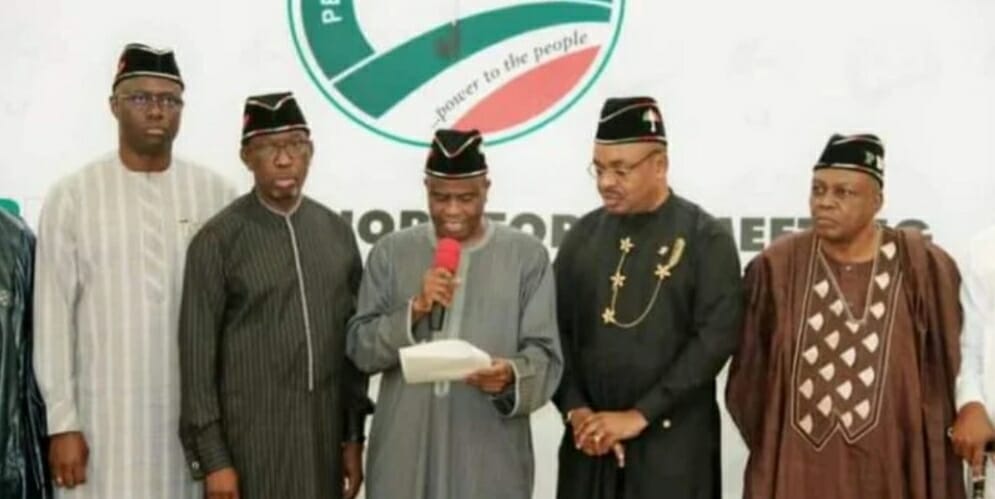Governors elected under the platform of the Peoples Democratic Party (PDP) have called on the national assembly to adopt electronic transmission of election results in the electoral act amendment bill.
The senate and the house of representatives passed the electoral act bill in July but with different versions on the contentious issue of transmission of election results electronically.
The lawmakers at the upper chamber proposed that the Nigerian Communications Commission (NCC) must certify that national coverage is adequate and secure while the national assembly must give approval before the Independent National Electoral Commission (INEC) can transmit results.
But lawmakers at the lower chamber adopted that the commission may transmit results of election through electronic means where and when practicable.
The bill will be transmitted to President Muhammadu Buhari for assent after the harmonisation of the two versions by the conference committee of both chambers.
In a statement issued on Monday, the PDP governors asked the national assembly to adopt the house of representatives’ version of the bill.
The governors advised the lawmakers to be “guided by national interest” while harmonising the bill.
“The PDP Governors’ Forum welcomes the National Assembly from its recess and enjoins it to immediately set up its Conference Committee that will harmonise the different versions of the Electoral Act Amendment Bills passed by both Chambers, with a clear mandate to harken to the wishes of Nigerians and be guided by the national interest, particularly on the issue of electronic transmission of results,” Aminu Tambuwal, governor of Sokoto and chairman of the PDP governors forum, said in a statement.
“The Forum insists that a further delay in passing and assenting to the Electoral Act Amendment Bill will do grievous and irreparable damage to preparations for the conduct of the 2023 elections in Nigeria.
“The PDP Governors’ Forum requests the Senate and House of Representatives (House) Conference Committee when set up, to adopt the House version of the Electoral Act Amendment Bill on the issue of Electronic Transmission.
“It should be noted that Section 52(2) of the House version says: “Voting at an election and transmission of result under this Bill shall be in accordance with the procedure determined by the Commission” and section 52 (2) of the Senate version provides: “The Commission may consider electronic transmission of results provided that the national coverage is adjudged to be adequate and secure by the Nigeria Communications Commission (NCC) and approved by the National Assembly.”
“The Senate version which subjects the decision of INEC to deploy electronic transmission to the decision of the Nigerian Communications Commission and National Assembly is manifestly a usurpation of the powers of INEC and offends relevant provisions of the Nigerian Constitution that guarantees INEC’s autonomy and independence.
“The Forum recognises that INEC has demonstrated the capacity to transmit votes electronically, both in recent off season elections and with the introduction and deployment of the Biomodel Voters Accreditation System (BVAs), used in the recent bye-election in Delta State.
“Furthermore, it is necessary to remind the Senate and House Conferees that both Chambers had already approved in section 63 (5) of the Bill as follows: “The Presiding officer shall transmit the results including total number of accredited voters and the results of the ballot in a manner as prescribed by the Commission.”
“It is obvious that section 52 (2) of the Senate version is manifestly inconsistent with section 63 (5) contained in the same Bill. No doubt, section 63 (5) which both Chambers approved is consistent with S.52 (2) of the House version and should be upheld by the Conference Committee.
“The Conference has no choice but to adopt the House version as to do otherwise would lead to unnecessary complications and conflicts even within the Bill.”
The governors also asked the national assembly to “jettison the house of representatives decision that has the effect of forcing all political parties to adopt only one method of conducting primaries”.
